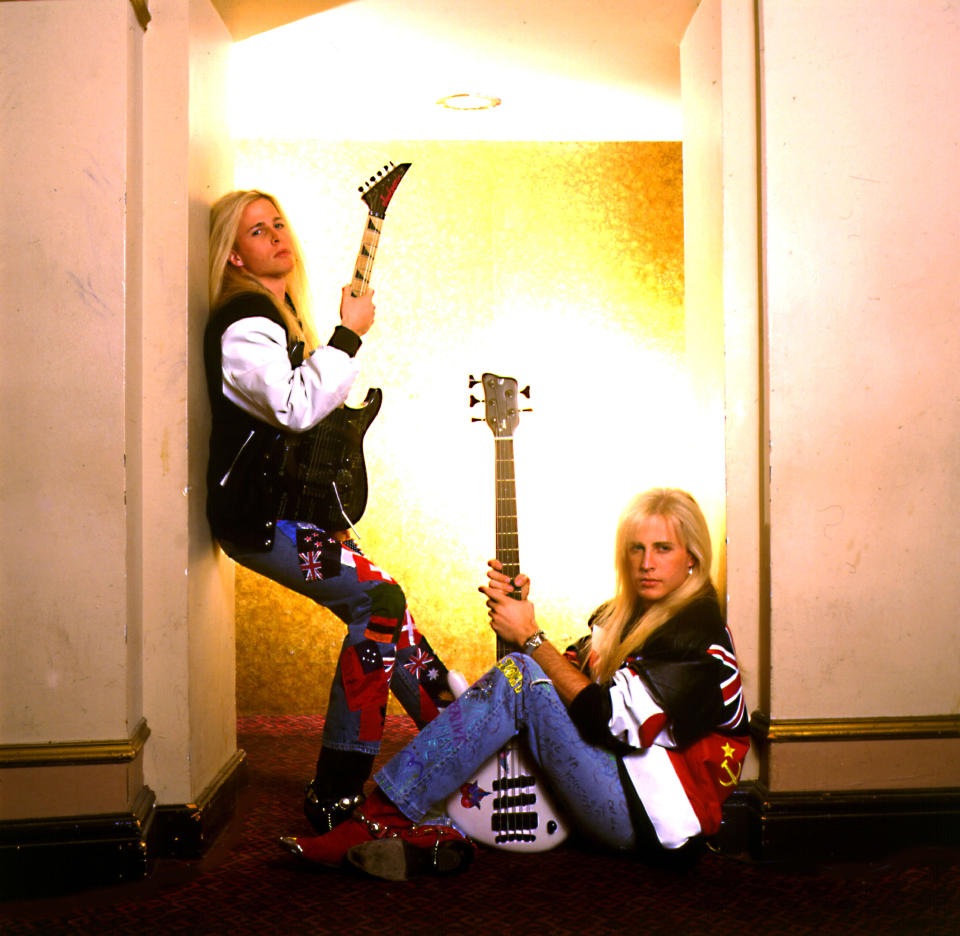“This is the whole journey. If you’ve ever wondered what you were missing, because you didn’t see past ‘Milli Vanilla,’ you need to listen to this.”
So speaks Gunnar Nelson, sitting with his twin brother and Nelson bandmate Matthew Nelson, as they discuss their cheekily titled new best-of compilation, Greatest Hits (And Near Misses). The blond brothers — grandsons of ‘50s sitcom pioneers Ozzie and Harriet Nelson and sons of teen idol-turned-Americana troubadour Ricky Nelson — have a vast, 30-plus-year catalog that spans pop, folk, country, and even experimental hard rock. But they self-deprecatingly acknowledge that most casual listeners will best know them from their smash debut album, 1990’s After the Rain.
Gunnar and Matthew became massive stars in the early ‘90s due to support from MTV, during a pre-grunge era when bands like Motley Crue, Poison, and Ratt still ruled the airwaves. But with harmony-laden powerpop sound, they never really fit in with that “hair-metal” scene — other than the fact that they had, well, really amazing hair.
[embedded content]
“Everybody put us in this category of the hair-metal thing. But the fact was, none of those bands liked us. None of those bands would take us on tour,” notes Matthew. “Gunnar and I kind of came up in the whole Laurel Canyon sound era in the late ‘60s, early ‘70s. So, you heard that music… it was more folky, almost.”
“I think what you got with Nelson, with the sound that eventually became Nelson, was the influences from our dad’s Stone Canyon Band being around,” says Gunnar. “Growing up with our dad, putting the Stone Canyon Band together in our house, you had people like everyone from Dylan to Linda Ronstadt to the Byrds and Jackson Browne stopping by the house all the time.”
However, Gunnar adds, “I don’t blame anybody back in the day [for stereotyping us], because our image was designed to promote a response. It wasn’t a record company fabrication. Everything that was done, Matthew and I did. We wrote all the songs, produced all the records, put the look together.”
“And frankly, you know, our dad had just died and we were gut-shot. We had to kind of find ourselves, which we did — spent some time overseas, which is where the look came from,” says Matthew. “And our whole thing was, ‘Love us or hate us, you’re gonna know who we are.’ And that worked.”
It certainly did — at least in the short-term. After the Rain spawned two top 10 singles, including “(Can’t Live Without Your) Love and Affection,” which landed Nelson in the Guinness Book of World Records when it topped the Billboard Hot 100. (The Nelsons are the only family to reach score No. 1 hits in three successive generations, beginning with Ozzie and Harriet.) But from the get-go, Nelson were always a polarizing band — “men without a country,” as Gunnar puts it — and not just because of their cartoonish image. They were also accused of being a record-label boy band riding on the coattails of their famous father, although their lives were actually not all that rosy or cushy.
Watch Nelson’s full, extended Yahoo Entertainment below, in which they discuss their lost concept album Imaginator, being their first and only unsigned band to play Saturday Night Live, the secret song they recorded for Bill and Ted’s Excellent Adventure, and much more:
[embedded content]
“We had to work extra hard because we were legacies. I think the perception of us being ‘trust fund kids’ and things being easy for us kind of sucks,” stresses Gunnar. “You know, the critics, those were the only people that were mentioning the fact that we were progeny and that our dad was Ricky and our grandparents were Ozzie and Harriet. But we sold 7 million records to a bunch of kids who had no idea who Ricky Nelson was.”
“People think that we came into money. We were like the poor kids in the rich neighborhood,” Matthew elaborates. “Our dad died, and unfortunately the truth was, he was over $4 million in debt and we spent years paying that back. Everybody has their own story. I think we’re proof in the pudding that you can’t always just judge it on the cover.”
As Matthew notes, Rick Nelson and the twins’ mother, actress Kristin Nelson (the sister of actor Mark Harmon) “had a horrible Hollywood divorce.” Kristin, who Gunnar describes as a “narcissist” and Matthew says “liked vodka,” blamed Ricky’s hectic concert touring schedule for the demise of their marriage, “because she couldn’t accept her own responsibility in that,” says Gunnar. So, when her sons got the music bug at an early age, she was far from supportive. In fact, when Matthew and Gunnar graduated from high school, she even wrote them individual letters telling them they were “delusional” and would never be successful. “Our mother made it very difficult for us to play music,” says Matthew. “She said we always reminded her of [Rick], and the business was horrible and it was ‘gonna take you down.’”
Gunnar admits that he and his brother “were always thinking that maybe one day, we were going to get that ‘You boys done good, great job. I was wrong about you’ kind of thing” from their once-doubting mother. And they thought that day had finally come when After the Rain started selling seven-figure numbers and “Love and Affection” went to No. 1. Around that time, Kristin, with whom they hadn’t spoken in years, reached out asking for tickets to their hometown gig at L.A.’s Universal Amphitheater. The 8,000-seat venue was a “big deal” to the boys, as it was the last place they had seen their father perform, and they were “really excited” that their mom wanted to attend. But after dispatching a limousine to pick her up and setting aside the “best seats in the house,” Kristin gave those tickets to her housekeeper instead. Later on, Kristin and her second husband did show up for another sold-out Universal Amphitheater show, but Matthew and Gunnar spotted them walking out before the concert was over. Kristin later told her sons she left early because she “wasn’t impressed.”
“Boy, you know, we could do an entire interview on that. Narcissism is just this rabbit hole we could go down forever,” sighs Gunnar. “But it’s taken us kind of a lifetime to kind of wrap our brains around the fact that…”
“…that it wasn’t us, and you can’t cure it,” Matthew interjects.
“It’s like our dad said in his song ‘Garden Party,’ you can’t please everyone. So you gotta please yourself,” Gunnar continues. “And I think there are a lot of kids who spend way too much time trying to get that approval that they’ll never get. But it’s not their fault. And it’s not their problem. It’s just the person they’re trying to get approval from is broken.”
[embedded content]
While the twins’ relationship with their mother was always strained, they were very close with their father, who supported their musical dreams. Unfortunately, Rick Nelson did not live to see his sons’ chart-topping success: He and six other passengers were killed when his band’s private plane, a refurbished World War II-era DC-3 that he had purchased from Jerry Lee Lewis, crashed while en route to a concert on New Year’s Eve 1985. Rick was 45; Gunnar and Matthew were 18. Eerily, the Nelson twins were supposed to be on the plane that night — but at the last minute, their dad called them and told them not to come.
“We had never flown on the [DC-3] before, so the topic came up about New Year’s Eve. [Rick] was going to be doing a show in Dallas and he said, ‘Hey, why don’t you guys meet me in Alabama the day before New Year’s? We’ll hang out there and then you can fly on the plane for the first time and we can spend New Year’s together in Dallas,’” Gunnar recalls chillingly. “And it was a bizarre thing. I know it sounds crazy, but we were supposed to leave. We got a phone call from our dad and he sounded strange — not the way he normally sounded. And he said, ‘You know, boys, I was just thinking. … I want you guys to fly to Dallas directly commercial and meet me there.’ And we’re like, ‘Well, Pop, the whole reason for us to go on this trip was to fly on the plane with you and the band!’”
But Rick was “adamant” about this decision, so Gunnar and Matthew eventually decided to stay home. “I think it’s likely he just had a gut feeling, and our family’s pretty intuitive and we kind of go with things like that,” says Gunnar. “Our dad was such an affable guy that when he was sounding like that, we both knew that it wasn’t the time to argue.”
As tense as the brothers sometimes get when discussing their fraught relationship with their mother, their bitterness really comes to the surface, understandably, when talking about the media’s coverage of their father’s tragic death. Matthew actually describes it as “the beginning of an era with the press where humanity didn’t matter anymore,” because the news of Ricky’s plane crash was reported before the family had even been notified.
“I found out about the accident on the radio,” says Matthew, as his brother sits beside him noticeably tearing up. “I was listening to the car radio and [Rick’s] songs came on, and at the end of the third song, I was like, ‘Wow, I don’t know why they’re playing his music on the rock station! This is awesome!’ And I pulled over, thank God, and the DJ came on after a long pause on the last note of ‘Garden Party’ and said, ‘This has been a tribute to Rick Nelson, who was killed with his band on his way to…’ And honestly, I was with somebody at the time and they looked at me and said, ‘It can’t be true!’ And I apparently got out of the car and passed out. I don’t remember anything. It was just too much. Gunnar found out about it on the television five minutes after I did. So, you know, that whole thing of ‘take the time to notify the family,’ that didn’t happen with us, because that comes with being a family like ours. … I’m pretty pissed off about it.”
“Also, to add insult to injury… some idiot at the Washington Post made up a story, completely made up, that ‘Rick Nelson was freebasing on a plane and the plane burned up’ — 100% untrue, 100% percent a lie,” says Gunnar. “Not only are we dealing with the loss of our best friend, who we were living with at the time, and the entire band who was our surrogate family, but we are now meeting press at our gate of our house going, ‘What do you think about your father’s death due to…’ whatever.”
[embedded content]
Nelson never repeated the commercial success of After the Rain; by the time the follow-up Because They Can came out, five years had passed due to various problems with their record label at the time, Geffen, and grunge had taken over. Nelson did record a heavier, darker concept record, Imaginator, that was shelved for years, but in general, they didn’t want to hop on the grunge bandwagon. Even though they obviously had plenty of darkness and angst in their personal lives to pull from, they thought it would be too “predictable” to sing mopey songs about their demons, and instead, they wanted to play what they amusingly dubbed “confidence rock.” And as they look back with Greatest Hits & Near-Misses, they have no regrets.
“We talk about this a lot. If we didn’t have our mother, the way that she was; if we didn’t lose our father when we were 18 in a plane crash that we were supposed to be on; if the press didn’t tell the world that our dad had died in a plane crash before they called us… we wouldn’t be the same guys,” muses Matthew. “The fact is, all of this stuff is stuff that made us who we are. We just wouldn’t have had the drive that we had, had we had the rosy life everybody thought we had.”
“And that’s the irony,” says Gunnar.
Read more from Yahoo Entertainment:
Follow Lyndsey on Facebook, Twitter, Instagram, Amazon
— Video produced by Jen Kucsak, edited by Jimmie Rhee




